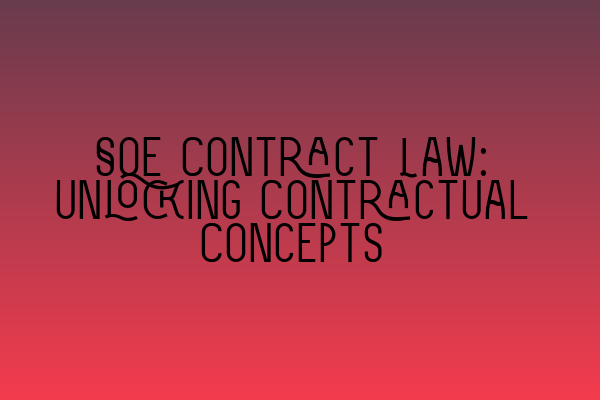SQE Contract Law: Unlocking Contractual Concepts
Welcome to our blog post on SQE Contract Law, where we will delve into the fascinating world of contractual concepts. Contract law forms the foundation of legal relationships, and understanding its intricacies is crucial for any aspiring solicitor. So, let’s unlock the key concepts of contract law and explore how they apply to real-world scenarios.
Understanding Contracts and their Elements
Before we dive deep into the details, let’s start with the basics. A contract is a legally binding agreement between two or more parties. To make a contract enforceable, certain elements must be present:
- Offer and Acceptance: One party must make an offer, and the other party must accept it, forming a mutual agreement.
- Consideration: There must be something of value exchanged between the parties, such as money or goods.
- Intention to Create Legal Relations: The parties must intend to create a legal relationship.
- Capacity: The parties involved must have the legal capacity to enter into a contract.
Now that we have a solid foundation, let’s explore some key contractual concepts:
1. Breach of Contract
A breach of contract occurs when one party fails to fulfill their obligations as stated in the agreement. This can result in damages or other remedies for the innocent party. It is essential to understand the types of breaches, such as material breach and anticipatory breach, in order to advise clients effectively in such situations.
2. Contractual Terms and Interpretation
Contracts are made up of terms that define the rights and obligations of the parties involved. Understanding how to draft and interpret these terms is crucial. Express terms are explicitly stated in the contract, while implied terms are understood to be included. It’s important to consider the contra proferentum rule, which states that any ambiguity in a contract should be interpreted against the party who drafted it.
3. Conditions, Warranties, and Innominate Terms
Contracts often include conditions, warranties, and innominate terms. Conditions are essential terms that go to the core of the contract. Breach of a condition allows the innocent party to terminate the contract. Warranties, on the other hand, are less crucial terms and generally result in a claim for damages rather than termination. Innominate terms fall somewhere in between and their consequences depend on the seriousness of the breach.
4. Discharge of Contracts
Contracts can be discharged in various ways, including performance, agreement, frustration, or breach. Understanding the different methods of contract discharge is essential when advising clients or handling disputes.
5. Remedies for Breach of Contract
When a contract is breached, the innocent party may seek remedies. These can include damages, specific performance, injunctions, or the right to terminate the contract. Knowing which remedy is appropriate in a particular scenario is vital for effectively representing clients.
6. Contracts with Consumers and Unfair Contract Terms
Contracts with consumers are subject to specific regulations to protect the consumer’s rights. There are laws in place to regulate unfair contract terms, ensuring that consumers are not disadvantaged by unfair clauses or practices. Understanding these regulations is crucial when advising clients or preparing contracts for consumer transactions.
7. International Contracts and the CISG
In an increasingly globalized world, it’s important to have an understanding of international contracts. The United Nations Convention on Contracts for the International Sale of Goods (CISG) provides a framework for international commercial contracts. Familiarity with the CISG can be valuable when dealing with cross-border transactions.
These are just some of the key concepts of contract law that every SQE Contract Law candidate should be well-versed in. To further enhance your knowledge, we recommend checking out our related articles:
- Mentorship for Aspiring Solicitors: Nurturing Talent in the Legal Field
- Mentorship for Aspiring Solicitors: Finding Guidance on Your Legal Journey
- Exploring Alternative Dispute Resolution: An Effective Approach to Legal Conflicts
- The Art of Contract Drafting and Negotiation: Skills Every Solicitor Should Master
- Navigating the Legal Practice Course (LPC): Your Path to Solicitor Qualification
By exploring these related articles, you’ll gain additional insights into the legal profession, mentorship opportunities, alternative dispute resolution, contract drafting, and the path to becoming a qualified solicitor.
At SQE Contract Law, we strive to provide comprehensive resources to help aspiring solicitors navigate the complex world of contract law. With dedication, knowledge, and the right guidance, you can unlock the potential of contractual concepts and excel in your legal career.
Stay tuned for more informative articles as we continue to explore various aspects of law, career development, and legal education.
